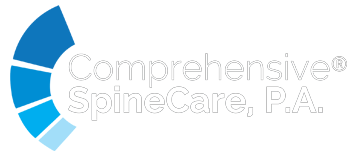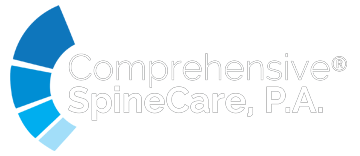While back pain is a relatively common problem that is not always cause for concern, there are a few types of back pain that could be indicative of a problem with your spine. In fact, paying attention to what your back pain does throughout the day is an important tool in determining what is causing your pain. It is also important to pay attention to where the pain is located and whether or not it “moves” to other locations.

One potential cause of back pain that many people are concerned about is a slipped disc. This condition goes by a few different names such as slipped disc, herniated disc, protruding disc, ruptured disc, pinched nerve, or bulging disc. As all these various names suggest, a slipped disc occurs when the discs between vertebrae move out of their proper position, which forces the inflammatory proteins inside the disc to leak out.
When this happens, there are two types of pain that you may experience: nerve pain and/or disc pain. Nerve pain occurs when the leaking disc material pinches, inflames, or irritates a nearby nerve. Nerve pain associated with a slipped disc or pinched nerve is generally known as sciatica. Sciatica describes a radiating pain that starts in the back and moves down through the leg.
The other type of pain you may experience is disc pain. In most cases, a slipped disc alone does not cause pain (unless it is pressing on a nerve). However, disc pain can occur in cases where the disc has either been dehydrated or has degenerated to the point of causing spinal instability. Disc pain from a slipped disc can also indicate degenerative disc disease and is characterized by a dull, chronic pain around the spinal disc.
Now that we know a little more about what a slipped disc is and the types of pain that it can cause, let’s take a look at what you should look out for. While only a spinal specialist can provide an accurate diagnosis, you may have a slipped disc if you have:
Pain While Sitting
When you are in a sitting position, there is a large amount of pressure being exerted on the lower spine. Thus, any slipped discs may become further dislocated as a result of this pressure. As you can probably guess, increased pressure on a slipped disc can cause pain that develops or gets worse as you sit.
Pain During Certain Activities

Just as sitting can exert more pressure on your lower spine and irritate a slipped disc to cause pain, there are also a few other activities that can have this same result. If you feel consistent pain while bending forward, coughing, sneezing, lifting heavy objects, or pushing/pulling a heavy object, then this could indicate the presence of a slipped disc.
Radiating Pain
Finally, a good indication that you may have a slipped disc is pain that radiates from the spinal cord down the back of your leg. In medical terms, this is known as sciatica and it is commonly associated with slipped discs in the lower back that sit near the spinal nerve roots. Consequently, when these discs slip out of place, they affect these nerve roots, which run all the way down the leg. Slipped discs can either directly compress these nerves by pressing on them, or the acidic contents of the disc can chemically irritate the nerves, making them inflamed.










